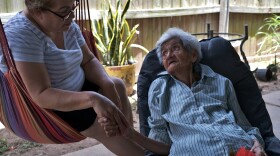Hello, Radio Readers! I’m Jane Holwerda from Dodge City, Kansas, here to talk about our Fall 2018 book series on aging, death and dying.
And, believe it or not, my task is to talk about these topics from the perspective of a comic book, or, more correctly, of a graphic memoir, of a “real” story conveyed through some narrative and lots of drawings (that’s the “graphic” part).
The author is Roz Chast whose quirky cartoon figures of rather lumpish bespectacled characters with disgruntled expressions are known and beloved by readers of The New Yorker magazine since the late 1970’s.
Her memoir, Can’t We Talk About Something More Pleasant?, was published in 2014 to wide acclaim and popularity, interestingly, as the book is about Chast’s efforts, as an only child, to care for her parents as they aged well into their nineties then died. The title suggests one of the challenges in caring for our parents is seeing that they need our attention and care. Isn’t that the crux of it all?
A year or so ago, my uncle, in his late 80’s, sold his car; we’re not sure why but we think in driving it, he had a scare of some kind – an almost accident, or found himself momentarily lost, disoriented in a community he’d lived in almost all of his 80+ years. Anyway, he sold the car and got a pretty good price for it. You can bet we were relieved, mostly because his having made the decision meant we didn’t have to.
But then, almost immediately after he deposited the check, he regretted selling the car, he moped for months; even now he says he misses it. Which, between you and me, that he misses the car is pretty hard to believe. I mean, it was a relic, expensive to maintain, and the heater only worked when it was 90’ out.
Of course, it’s not the car he misses so much as he misses the mobility it gave him, a sense of being able to choose where and when to go, to go anywhere. As a much younger guy, he was the master of the transcontinental road trip, at one time, in a Nash Rambler.
Nowadays, he takes an elder bus to the doctor’s, or my sister who lives up the street from him, and when I get back home, we taxi him to the grocery store. We, in our own ways, encircle him, surround him, in our efforts to help him. I think he’s getting used to this. But it bites, the letting go of what we believe makes us who we were. It bites to become the adult when we’ve been the child for so long. It must bite deeply to surrender our care to those we’ve known most of our lives to be children.
This challenge, this transition, for me, is depicted in Chaz’s memoir, in the contrast she creates by juxtaposing captioned black and white photos of herself as a child with her parents against colorful cartoon frames of the three of them.
I gotta ask: which seems more realistic to you: the cartoon or the photograph? Which seems more real?
For HPPR Radio Readers, I’m Jane Holwerda, from Dodge City, Kansas.







